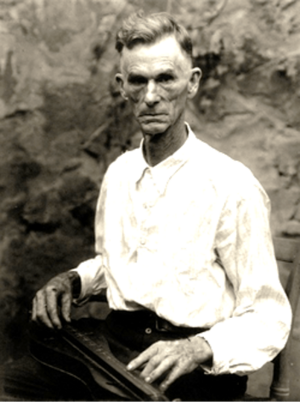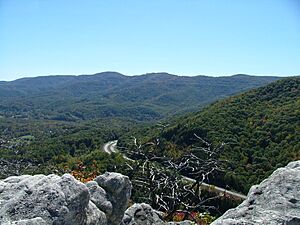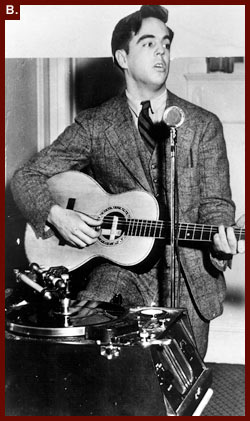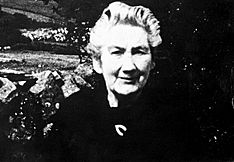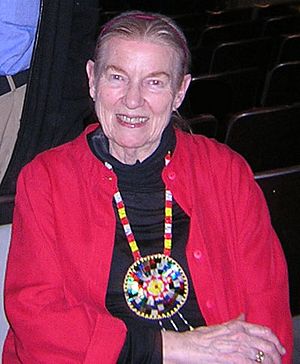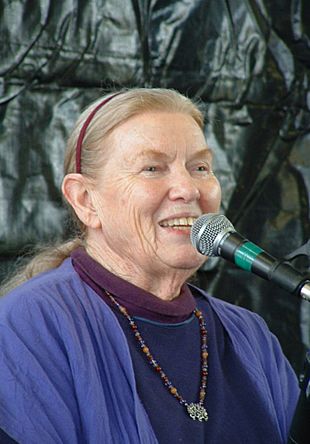Jean Ritchie facts for kids
Quick facts for kids
Jean Ritchie
|
|
|---|---|
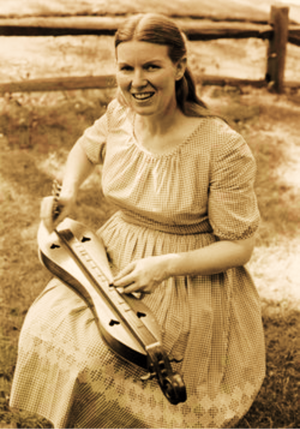
Ritchie playing the dulcimer, c. 1950s
|
|
| Born |
Jean Ruth Ritchie
December 8, 1922 Viper, Kentucky, U.S.
|
| Died | June 1, 2015 (aged 92) Berea, Kentucky, U.S.
|
| Education | University of Kentucky |
| Occupation | Folk musician |
|
Label(s)
|
Folkways, Elektra, Sire, Greenhays, Flying Fish, Riverside, Tradition, Argo, Collector, June Appal Recordings, Pacific Cascade Records, Warner Brothers |
| Spouse(s) | George Pickow (m. 1950; died 2010) |
Jean Ruth Ritchie (December 8, 1922 – June 1, 2015) was an American folk singer, songwriter, and Appalachian dulcimer player. Many people called her the "Mother of Folk." She grew up learning hundreds of traditional folk songs from her family. These songs were often old British and Irish tunes.
Jean Ritchie shared these songs with many audiences. She also wrote her own songs, keeping the traditional style. She is famous for helping to bring back the Appalachian dulcimer. This instrument was traditional in her community. She played it on her albums and wrote books to teach others.
She also traveled to collect folk music. She went to the United States, Britain, and Ireland. Her goal was to find the origins of her family's songs. She wanted to help keep traditional music alive. Jean Ritchie inspired many famous musicians. These included Bob Dylan, Joan Baez, and Joni Mitchell.
Contents
Growing Up in Kentucky
Her Musical Family
Jean Ritchie was born in Viper, Kentucky. This small community is in the Cumberland Mountains. Her parents were Abigail and Balis Wilmar Ritchie. The Ritchie family was known for singing old songs. They were one of Kentucky's "great ballad-singing families."
Jean's father, Balis, loved playing the Appalachian dulcimer. He even printed a book of old songs. In 1917, a folk music collector named Cecil Sharp visited. He collected songs from Jean's older sisters. Many of Jean's siblings loved performing traditional music. They wanted to preserve it.
Many Ritchies went to the Hindman Settlement School. This school encouraged students to value their heritage. It was a place where many old songs were found. The Ritchie family learned songs from many sources. These included neighbors, relatives, and school friends.
Jean's family ancestors came from Scotland. They moved to the United States. Her great-great-grandfather, Alexander Crockett Ritchie, settled in Kentucky. Most of the Ritchie family fought for the Confederate side in the Civil War.
Jean also learned songs from her "uncle" Jason. He was actually her father's cousin. He was a lawyer and farmer. He knew many old songs that Jean later shared.
Early Life and Education
Jean was the youngest of 14 children. She was one of ten girls who shared one room. Her family lived on a farm. Jean quickly learned songs. She performed at local dances and county fairs. She even won blue ribbons for her singing.
The Ritchie family sang for fun and while working. They knew over 300 songs. These included hymns, old ballads, and popular tunes. They usually sang without instruments. They would often sing harmonies together. They didn't even know their music was called "hillbilly music" until they got a radio in the 1940s.
Jean graduated from high school in Viper. She then went to Cumberland Junior College. Later, she graduated from the University of Kentucky in 1946. She earned a degree in social work. In college, she sang in the glee club and choir. She also learned to play the piano.
During World War II, Jean taught at an elementary school. In 1946, she was recorded singing traditional songs. Her sisters Edna, Kitty, and Pauline also sang with her.
Moving to New York City
After college, Jean became a social worker in New York City. She worked at the Henry Street Settlement. There, she taught her Appalachian songs to children. This caught the attention of folk singers and scholars. She became friends with famous musicians. These included Woody Guthrie, Pete Seeger, and Alan Lomax.
Many people saw Jean as a perfect traditional musician. She grew up in the countryside. She played the dulcimer. Her songs came directly from her family. In 1948, she performed with The Weavers and Woody Guthrie. By 1949, she was a regular guest on a radio show. It was called Oscar Brand's Folksong Festival.
In 1949 and 1950, she recorded many songs and stories for Alan Lomax. These recordings are now available online. She was also recorded for the Library of Congress in 1951. By 1951, Jean became a full-time singer. She also collected folk songs and wrote her own. Elektra Records signed her. She released her first album in 1952. It was called Singing the Traditional Songs of Her Kentucky Mountain Family.
Exploring Songs: The Fulbright Expedition
In 1952, Jean Ritchie received a Fulbright scholarship. This allowed her to travel. She wanted to find connections between American ballads and songs from England, Scotland, and Ireland. She started by writing down the 300 songs she already knew.
Jean and her husband, George Pickow, spent 18 months traveling. They recorded, interviewed, and photographed singers. They met famous folk singers like Elizabeth Cronin in Ireland. They also met Jeannie Robertson in Scotland. When people asked what songs they sought, Jean would often sing a few lines of "Barbara Allen."
In 1954, Jean released some of these British and Irish recordings. The album was called Field Trip. It showed how her family's songs were similar to those from overseas. Later, she published a book with transcriptions and photos. It was called From Fair to Fair: Folksongs of the British Isles.
While in Britain, Jean sang at concerts. She also appeared on BBC Radio programs. She even visited the famous composer Ralph Vaughan Williams. She sang for him and his wife.
Jean Ritchie's Musical Legacy
Jean Ritchie wrote a book about her family in 1955. It was called Singing Family of the Cumberlands. The book showed how songs were part of daily life. They sang while working on the farm or gathered on the porch. This book is still used in American schools today.
Jean also knew hymns from her church. These were sung in a special, soulful way. She helped make songs like "Amazing Grace" more popular. Her family's versions of hymns were released on an album in 1959.
In 1959, Jean directed and sang at the first Newport Folk Festival. She also helped with the first folklore panel for the National Endowment for the Arts.
Her 1961 album, Ballads from Her Appalachian Family Tradition, featured many old songs. These included "False Sir John" and "Barbary Allen."
Her traditional song "My Dear Companion" was recorded by Linda Ronstadt, Dolly Parton, and Emmylou Harris. Judy Collins also recorded some of Jean's songs. She even used a photo by Jean's husband on her album cover.
In 1963, Jean recorded an album with Doc Watson. It was called Jean Ritchie and Doc Watson Live at Folk City. Doc Watson helped make the song "Shady Grove" famous. He likely learned it from Jean Ritchie.
As folk music grew in the 1960s, new political songs appeared. Jean mostly stuck to traditional songs. But she also wrote songs about Kentucky's environment. These songs talked about logging and coal mining. Songs like "Black Waters" and "The L&N Don’t Stop Here Anymore" became well-known. Johnny Cash even covered "The L&N Don’t Stop Here Anymore." Jean sometimes used a fake name, "'Than Hall," for her mining songs. She thought they might be better received if attributed to a man. She also didn't want to worry her mother.
The song "Nottamun Town" was learned from her uncle Jason. It was covered by many artists. Bob Dylan even used its tune for his 1963 song "Masters of War." Jean learned to change songs slightly each time she sang them. This was a natural part of traditional music for her.
Her album None but One (1977) won an award from Rolling Stone Magazine. This helped her music reach a younger audience. Her 50th anniversary album, Mountain Born (1995), featured her two sons. In 1996, a documentary about her was made. It was called Mountain Born: The Jean Ritchie Story.
The Dulcimer Revival
Jean Ritchie is famous for bringing the Appalachian dulcimer to public attention. She started the "dulcimer revival." She often sang without instruments. But sometimes she played the dulcimer, autoharp, or guitar. The Appalachian dulcimer is a quiet instrument. It has a soft, gentle sound. It was likely first played by Scotch-Irish immigrants in the 1800s. The Ritchie family played their dulcimers with a goose-feather quill.
Jean's father played the dulcimer. But he didn't let his children touch it. When Jean was four or five, she secretly played it. She picked out the tune to "Go Tell Aunt Rhody." By 1949, her dulcimer playing was a key part of her style.
Her husband, George Pickow, made her a dulcimer as a gift. They realized others might want one too. George's uncle helped them set up a workshop in Brooklyn. At first, dulcimers were shipped unfinished from Kentucky. Jean's relative, Jethro Amburgey, made them. George finished them, and Jean tuned them. They soon sold 300 dulcimers. Later, they started making them completely themselves.
Jean's use of the dulcimer and her book, The Dulcimer Book (1974), inspired many musicians. Today, you can find dulcimers for sale at most folk festivals. Because fans kept asking for more dulcimer music, she recorded The Most Dulcimer in 1984. Every song on that album featured the dulcimer.
Personal Life and Passing
Jean Ritchie was married to photographer George Pickow. They were married from 1950 until his death in 2010. They had two sons, Peter and Jonathan. She lived in Port Washington, New York. In 2008, she was honored by the Long Island Music Hall of Fame.
In late 2009, Jean had a stroke. This affected her ability to communicate. She recovered somewhat and moved back to Berea, Kentucky. A friend said she was living quietly and well cared for. Jean Ritchie passed away at home in Berea on June 1, 2015. She was 92 years old.
Discography
- Singing the Traditional Songs of Her Kentucky Mountain Family (1952)
- Appalachian Folk Songs: Black-eyed Susie, Goin' to Boston, Lovin' Hanna (195-)
- Kentucky Mountains Songs (1954)
- Field Trip (1954)
- Courting Songs (1954) (with Oscar Brand)
- Shivaree (1955)
- Children's Songs & Games from the Southern Mountains (1956)
- Songs from Kentucky (1956)
- American Folk Tales and Songs (1956)
- Saturday Night and Sunday Too (1956)
- Singing Family of the Cumberlands (1957)
- The Ritchie Family of Kentucky (1958)
- Riddle Me This (1959) (with Oscar Brand)
- Carols for All Seasons (1959)
- British Traditional Ballads in the Southern Mountains, Vol. 1 Folkways (1961) (Child ballads)
- British Traditional Ballads in the Southern Mountains, Vol. 2 Folkways FA 2302 (1961) (Child ballads)
- Ballads (2003; vol. 1 and 2 above, issued on a single CD)
- Ballads from Her Appalachian Family Tradition (1961)
- Precious Memories (1962)
- The Appalachian Dulcimer: An Instructional Record (1963)
- Jean Ritchie and Doc Watson Live at Folk City (1963)
- A Time For Singing (1965)
- Marching Across the Green Grass & Other American Children's Game Songs (1968)
- Clear Waters Remembered (1974) Geordie 101
- Jean Ritchie At Home (1974) Pacific Cascade Records LPL 7026
- None But One (1977)
- Sweet Rivers (1981) June Appal JA 037 (hymns)
- Christmas Revels. Wassail! Wassail! (1982)
- O Love Is Teasin' (1985)
- Kentucky Christmas, Old and New (1987)
- Childhood Songs (1991)
- The Most Dulcimer (1992)
- Mountain Born (1995)
- High Hills and Mountains (1996)
- Legends of Old Time Music (2002, DVD)
Awards and Honors
- Rolling Stone Critics Award (1977) for her album None But One
- Folk Alliance’s Lifetime Achievement Award (1998)
- National Heritage Fellowship (2002) from the National Endowment for the Arts. This is the highest honor for folk and traditional arts in the U.S.
See also
- List of the Child Ballads
 | May Edward Chinn |
 | Rebecca Cole |
 | Alexa Canady |
 | Dorothy Lavinia Brown |


